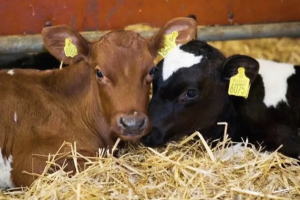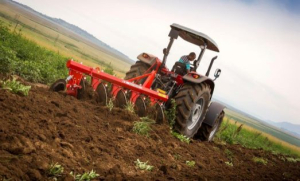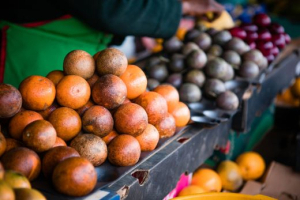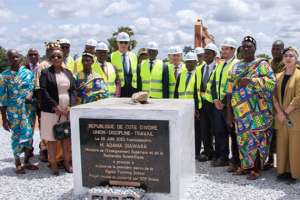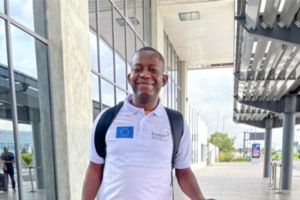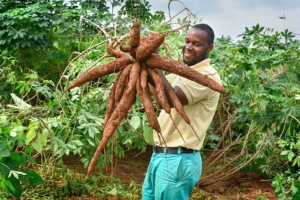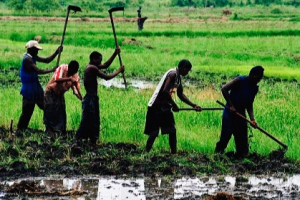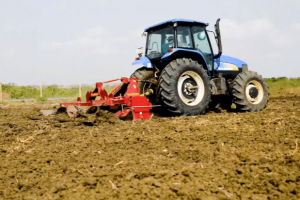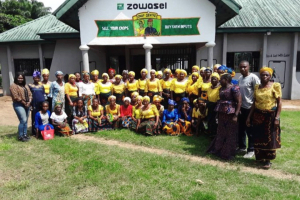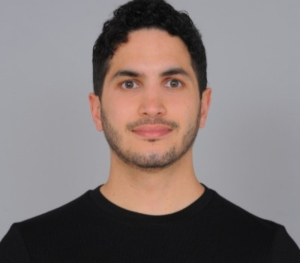Kenya: DigiCow digitizes livestock management
DigiCow Africa Ltd has developed several digital solutions to help farmers. Among them, the DigiCow Dairy application, its major solution, has won several awards.
Digicow Dairy App is a mobile application developed by Kenyan start-up DigiCow Africa Ltd, formerly FarmingTech Solutions. It provides “verified, reliable, and timely information on animal husbandry” to farmers. The solution was launched by Peninah Wanja, a Kenyan practicing extension officer determined to address the challenges faced by farmers in her country after witnessing them firsthand.
“It's a gap that I saw because when you look at the statistics and what is on the ground, our government has provided one extension officer for close to 4,000 farmers. So, there is a need for these critical services,” the tech entrepreneur explains.
The Digicow app is available for Android devices only. Once installed, it enables farmers to register by providing all the necessary information on their livestock. Based on that information, Digicow assists the farmers in their various tasks by notably providing real-time reports and sending notifications concerning important cow breeding dates.
"The App is designed to use the data and feedback production, financial reports, breeding and health reports. The farmer has the option to access analyzed financial statements and receives important alerts such as dropped milk production, when to observe for heat signs, indicating a failed conception, and when to expect the cow to calf among other advisories," Digicow indicates, describing its Android app.
The app features a virtual training room, available 24 hours a day. The training room includes on-demand written audio and video content. There is also a real-time chat room where farmers can interact, exchange ideas, and discuss with group experts.
Thanks to the Digicow app, DigiCow Africa Ltd has set up an ecosystem to help farmers increase milk yields, ensure better herd health, and improve farm organization among other things. Digicow also has a lending mechanism designed to provide farmers with credit for personal and agricultural expenses.
In 2019, DigiCow was named Kenya's most innovative agritech in a World Bank challenge. It claims to work with over 200,000 farmers.
Adoni Conrad Quenum
Nigeria: Farm4me specializes in contract farming
To offer his compatriots the opportunity to cash out from agriculture, Nigerian tech entrepreneur Adama Joseph Adama developed a solution that allows everyone to invest in farm projects and get a share of the profits generated.
Farm4me is a contract farming solution developed by a Nigerian agritech start-up. It allows users to invest in farm projects of their choice and receive dividends after a set period.
Through its Android app, a user can create an account and access the various investment opportunities offered by the agritech startup. With Farm4me, investing 227,000 naira (around $294) in the cultivation of a hectare of maize will yield 27,240 naira after 6 months, while a hectare of rice will cost 298,278 naira for a 53,690 naira profit over the same period. The company also offers investments in crops such as sesame, sorghum, and soybeans.
In addition to this service, the startup also rents out agricultural equipment, trades in agricultural products and inputs, and loans out farm inputs to small-scale farmers. Farm4me boasts some 32,223 users and 22,311 jobs created. The startup farms over 356,213 hectares. According to Play Store data, its app has already been downloaded over 5,000 times.
In 2021, Farm4me was awarded the prize for the best digital agricultural investment platform in West Africa by the Nigerian Institute of Brand Management. The same year, the World Quality Institute also awarded Farm4me the prize for the best provider of quality agricultural equipment sales and rental services in Africa.
Adoni Conrad Quenum
Cameroon: Jangolo shortens the fresh produce supply process
Owing to the number of middlemen in the agricultural value chain, food prices usually skyrocket from farms to markets. Despite that fact, farmers are usually unable to make decent living income from their products while consumers have to pay high prices for those same products. Jangolo wants to change that.
Jangolo is an e-commerce platform developed by a Cameroonian start-up. It gives consumers direct access to fresh produce via its web and mobile platforms. The Douala-based start-up behind the platform was founded in 2016 by Bertrand Foffe, Rodrigue Kwanga, and Paulin Nguekam. The aim is, among other things, to reduce local producers' post-harvest losses and boost consumers' purchasing power.
"We realized that by the time products go from farms to markets in Douala, their prices usually rise three folds on average. At least six middlemen intervene in the process, putting much pressure on the farmer who sells at a loss,” said Bertrand Foffe while expanding on the reasons that prompted the launch of Jangolo.
So, with two friends, Bertrand Foffe embarked on the Jangolo adventure. The start-up has developed an Android app, Jangolo Farm, which simplifies the buying process by allowing users to add products to their basket even when they are offline and validate the order when online. Users can also order via the web platform. Before anything, a user needs to be logged in or register an account. Once the orders are validated, the start-up's delivery service takes care of the delivery.
"Our services are focused on improving the living and working conditions of local farmers. We support farmers in their day-to-day operations. This means they can focus on their core business, and no longer worry about marketing” aspects, adds Bertrand Foffe.
Currently, the startup is only available in Douala. It says it is currently unable to serve other cities because some areas are hard to reach. In the areas covered, delivery costs CFAF500 (around $0.82). Buyers also have the choice to go to one of the startup’s sales outlets to simply pick their orders.
Jangolo boasts over 70,000 users, more than 5,000 products on its platform, and over 600 shops. Its application has already been downloaded more than a thousand times, according to Play Store data.
Adoni Conrad Quenum
OCP Africa and UM6P are Building Côte d'Ivoire's First Digital Farming School
Agriculture is one of Côte d'Ivoire's major economic sectors, and the world's biggest cocoa and cashew producer has been multiplying efforts to foster partnerships and develop this sector.
The Ivorian capital, Yamoussokro, will house a prestigious digital farming school in the coming months. The project was officially kicked off last Friday, June 9, by OCP Africa and Mohammed VI Polytechnic University (UM6P).
The new school will, according to the Minister of Higher Education, Adama Diawara, "produce high-quality human resources who will support the country's development, by tackling agricultural issues with innovative solutions, creating jobs for our graduates, and boosting entrepreneurship.
OCP Africa & @UM6P_officiel posent la 1ère pierre de la #Digital #Farming School à Yamoussoukro, en collaboration avec @inphbpolytech. Avec son approche pédagogique axée sur du Peer Learning et du Learning by farming, cette école, 1ère du genre en Afrique, sera adossée à une… pic.twitter.com/TmOfDxL014
— OCP AFRICA (@OCP_Africa) June 9, 2023
The upcoming school is valued at $4.9 million and is expected to open in the next 10-12 months. It wil be the first of its kind in Côte d’Ivoire.
The first batch of trainees should regroup 100 young AgriTech enthusiasts, according to a press release issued by OCP Africa. They will learn how to use digital tools and new farming technologies.
Also, the school will be attached to an experimental farm where the trainees will be able to put in practice and share what they learn.
The project is one of Morocco's many significant projects in Côte d'Ivoire - Projects initiated by King Mohammed VI, to bolster cooperation between the two nations.
For Côte d'Ivoire, however, the new digital farming school results from the government's efforts to develop agriculture. A sector, which, according to the African Development Bank (AfDB) is set to grow by 6.7% in 2022-2023.
Samira Njoya
Benin: Steve Hoda develops innovative technologies for the cereal industry
He is an economics expert with some 14 years of experience in the cereals industry. A few years ago, he co-founded an agritech company focused on the cereal segment.
Steve Hoda (photo) is a Beninese economist trained at the Faculty of Economics and Management Sciences of the University of Abomey-Calavi, where he graduated with a Master’s in Economics in 2009.
In 2017, he co-founded AfriRice, the agritech company that is now known as AfriCereal Group. His agritech company develops and implements innovative agriculture solutions, with a particular focus on cereal crops. It provides mechanization solutions for agricultural operations, offers technical assistance to farmers, and facilitates the connection of various stakeholders in the cereal industry.
The company aims to simplify agricultural tasks, minimize post-harvest losses, boost agricultural productivity, and improve farmers' incomes. With its solutions tailored to the African continent, AfriCereal Group is committed to providing safe and nutritious food worldwide. It works with non-governmental organizations and government institutions, assisting farmers in their agricultural campaigns from plowing to commercialization. It operates in the West African sub-region, particularly in Côte d'Ivoire, Burkina Faso, Togo, and Benin.
Its CEO, Steve Hoda, is the head of the agriculture commission of She is Great Benin, a program that encourages girls in STEM. He is also the coordinator of the Beninese chapter of the International Alliance for Sustainable Development Goals (AIODD). The agritech entrepreneur is an economic expert for local media outlet Le Soleil Bénin and also in charge of the management of a mini rice mill installed in Kérou, Northwestern region of Benin.
Between 2010 and 2011, he worked as an assistant to the Deputy Secretary-General for budget/program monitoring and evaluation at the Beninese Ministry of Development, Economic Analysis, and Prospective.
In 2018, AfriRice was celebrated by the FAO as one of the 20 success stories of agricultural innovations able to reduce hunger. The team was also selected by the US African Development Foundation to receive about $100,000 in grants to mechanize agricultural operations in three major rice and soybean production areas in Benin.
Melchior Koba
Nigeria: FarmERP launches AI platform to boost cassava cultivation
Cassava is one of the most widely consumed foods in sub-Saharan Africa. It is easy to cultivate and can be processed into many things. It nevertheless faces threats that can be overcome with technology.
On Tuesday, June 6, smart farm management software provider FarmERP announced the deployment of its FarmGyan platform based on AI, machine learning (ML), and computer vision in Nigeria.
According to the provider’s release, the platform aims to boost cassava cultivation in the country to improve productivity, profitability, and predictability.
"FarmERP [...] brings a specialized focus on helping Cassava farmers by extending the crop life [...] in Cassava plantations up by 40% through its tech-enabled platform," the release said.
Nigeria's cassava industry is the largest in Africa. For several years, the country has been the world's leading producer of cassava, accounting for 21% of global output. However, cassava plantations face several challenges, including the proliferation of pests, the presence of diseases, and extreme weather conditions.
To solve these problems, the FarmGyan platform will digitize the growth path. It will also monitor plants and quickly identify weed infestation by using drone images and AI models.
The platform will also be able to detect crop and soil moisture, crop water requirements and irrigation, and manage diseases through satellite-based crop health monitoring tools. Overall, FarmGyan will contribute to effective and efficient crop management.
After Nigeria, the company will extend its services to other African countries, notably Angola and Ghana. The aim is to help as many stakeholders as possible to practice Agriculture 4.0 to achieve profitable and sustainable agribusiness.
Samira Njoya
Yeesal Agri Hub promotes youth agripreneurship in Senegal
The organization wants to transform the agricultural ecosystem in West Africa. To achieve this, it offers training and workspaces and develops projects to support young entrepreneurs.
Founded in 2016, Yeesal Agri Hub is an innovative entrepreneurship support organization (SAEI) under the leadership of Awa Caba from Senegal. Its primary objective is to establish an ecosystem and deliver services that foster the economic growth of youth, returning migrants, novice farmers, and rural communities. The organization is dedicated to nurturing the skills and abilities of individuals interested in agribusiness, agritech, and the green economy while eliminating obstacles to entry into these sectors. Furthermore, Yeesal Agri Hub offers shared workspaces, platforms for promoting local products, and supportive environments to ensure entrepreneurs have optimal working conditions.
The organization has developed a dozen projects, including the Sandiara Agribusiness Innovation. This initiative aims to support rural entrepreneurs by introducing them to agroecological practices and assisting women's groups in the processing and marketing of agricultural products.
With partners such as Afric'innov, FAO, the United States Embassy in Senegal, the German Cooperation, and Broederlijk Delen, the hub has invested nearly 300,000 euros in agripreneurship. It has reached almost 1,000 direct targets and supported the design of six agritech tools.
In December 2022, it was selected to be part of the Rural Impacting Entrepreneurship project developed by the Small Foundation and Village Capital. In March 2023, it was also chosen for the Make-IT Africa project, a one-year program led by the German development agency GIZ, IRESEN (Institute for Research in Solar and New Energies), and impact agency Viridian Africa.
Melchior Koba
Ghana: TroTro Tractor connects farmers to farm machinery owners
Africa has a well-documented agricultural potential. Yet, its farmers struggle in various aspects of their work. This can change with the introduction of technology in the sector.
TroTro Tractor is a digital solution developed by a Ghanaian startup. The platform allows farmers and agricultural entrepreneurs to rent agricultural equipment such as tractors, seeders, combine harvesters, and sprayers. It was developed by an eponymous startup launched, in 2016, by Adam Muhammed Muhideen and Kamal Yakub to enable easy access to modern, high-quality agricultural machinery that can help Ghanaian farmers improve productivity and maximize yields.
Through its Android app, farmers and entrepreneurs can create accounts to access the machines available. The machines can be sorted by rental rates, geographical location, and most importantly type of machine. TroTro Tractor also has a USSD code that allows farmers with no access to the internet or living in remote areas to access its services.
The startup also offers training on how to use agricultural machines, technical assistance, and maintenance services. With its maintenance reminders and management reports, it also helps farmers plan and manage their farming operations more efficiently.
According to play store’s stats, the app has been downloaded just over 100 times. This, however, is not considered a good indication of the popularity enjoyed by the solution since most African rural areas lack internet connection and the USSD code may be the most used option.
Adoni Conrad Quenum
Nigeria: Zowasel improves the agricultural value chain by leveraging tech tools
Data science and artificial intelligence have improved processes and helped optimize results in several industries. Building on the opportunities they present, some Nigerian tech entrepreneurs decided to put them at the service of agriculture and online commerce.
Zowasel is a digital solution developed by a Nigerian startup. It enables smallholder farmers to use technology to improve their productivity, sustainability, and profitability across the value chain. The Lagos-based agritech startup that launched the solution was founded in 2019 by Jerry Oche and Oghenekome Umuerri. It aims to leverage data science and artificial intelligence to validate and secure the agricultural value chains, from farm to market.
To achieve that goal, it developed an Android app, which enables farmers to access its network of agronomy experts who evaluate productivity and strive to improve crop quality to attract good buyers.
Zowasel also checks buyers’ information such as their creditworthiness before connecting them to farmers. "We match buyers and sellers of the same commodity. [...] You decide on pricing and terms together, Zowasel enforces smart contracts and ensures that all transactions are shipped and payments are made after delivery without any issues," the platform indicates.
In 2021, the agritech startup claimed it was working with more than 1.5 million smallholder farmers in northern Nigeria. That same year, it secured $100,000 in funding from Guinness and Prosimador at the Zero Hunger Sprint 2021, an event held in Lagos and supported by the World Food Programme. Although it has launched operations in the Niger Delta to support smallholder farmers there, expansion outside Nigeria is not yet on its agenda.
Adoni Conrad Quenum
Morocco: Youssef Benkirane connects farmers and food retailers
He is a talented and determined innovator who is applying his engineering and scientific expertise to solving the agricultural challenges faced by farmers in developing countries.
Youssef Benkirane (photo) is a Moroccan entrepreneur who graduated from the Swiss Federal Institute of Technology in Lausanne with a master's degree in engineering, management, and entrepreneurship. He also holds a master's degree in general science and strategic management from CentraleSupélec. In 2022, he co-founded the agritech startup Terraa, which he oversees as the CEO.
The startup leverages innovative technologies to source fresh produce from farmers and deliver it to retailers within hours, connecting farmers with retailers, restaurants, and service providers. Its technology platform enables farmers to earn higher incomes and ensures consistent demand for their products while providing retailers with high-quality goods at competitive prices.
It also reduces food waste and decreases greenhouse gas emissions, freshwater use, and land use, contributing to a more environmentally friendly food supply chain.
In a round led by FoodLabs, a European venture capitalist and food, sustainability, and health research studio, Terraa raised US$1.5 million in pre-seed funding on February 14, 2023. Other investors in the round included UM6P Ventures, Outlierz Ventures, Musha Ventures, and DFS Lab.
"In the next few months, we will build some collection centers in all the major agricultural cities of Morocco. We will use them to store the produce collected from the farmers for distribution to the end customers," Youssef Benkirane told TechCrunch after the funding round.
Since 2021, the tech entrepreneur is an advisor for the decentralized autonomous organization MakerDAO. His professional career started in 2014 when he joined Rolex as an industrial engineer. Concurrently, he was a software engineer for luxury goods retailer Richemont.
In 2015, he was hired by the food and beverage company Try The World as a growth and data manager. Two years later, he joined Argon & Co, a Paris-based management consulting firm, as a senior consultant. In January 2019, he was named a senior partner at the consulting firm Bain & Company, and in December of the same year, he became a consultant at the firm. From 2021 to the creation of Terraa, he was the general manager of Zapp, a grocery retail company.
Melchior Koba


